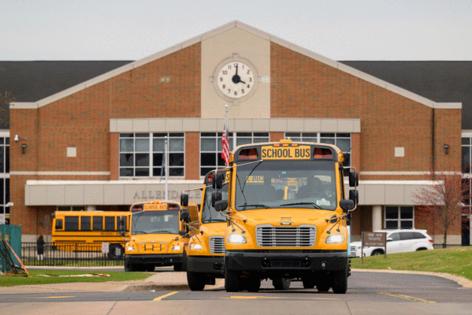Michigan lawmakers propose $65 million grant program to lower elementary school class
Published in News & Features
LANSING, Mich. — Michigan senators unveiled bills this week that would launch a $65 million grant program aimed at lowering class sizes in elementary schools and capping the number of students in the rooms of participating districts at 19 kids.
The proposals, which have to be approved by the Senate and House to become law, would mark a significant change in current state education policy, which has allowed districts to set their own class sizes and has provided little information to the public about the decisions.
The new measures' introduction Tuesday came after a Detroit News investigation in April documented 206 elementary classes — ranging from kindergarten through fifth grade — across 49 schools over the 2023-24 and 2024-25 years that had at least 30 students in them. The News used open records requests to compile the data.
Sens. Dayna Polehanki, D-Livonia, and Darrin Camilleri, D-Trenton — two former teachers — sponsored the bills to establish the class size grant program.
"Decades of educational research show that small class sizes in early grades, especially high poverty districts lead to higher reading and math achievement, better classroom behavior and engagement, more individualized instruction and stronger relationships between teachers and students," Polehanki said.
At least 31 of the 50 states already have laws about class sizes, tie funding to small classes or set goals for their schools to attempt to meet. As state leaders look for ways to improve struggling reading scores, Michael Rice, Michigan's outgoing superintendent of public instruction, has labeled achieving smaller class sizes for grades kindergarten through third in high-poverty schools "a top legislative priority for the Michigan Department of Education."
Under the new bills, the Department of Education would use $65 million to fund pilot programs aimed at maintaining or establishing small classes in grades kindergarten through third grade. Districts could apply for the money, but would have to have high percentages of economically disadvantaged students to qualify.
If districts received money through the initiative, they would have to maintain average class sizes in kindergarten through third grade of 17 students with a cap of 19 pupils, according to the text of the bills.
For the 2024-25 school year, The News examined 797 individual classes across 49 elementary schools. Of those, 8% of the classes had fewer than 20 students, while 63% had 25 or more students.
The bills would specifically require the Muskegon Heights Public School Academy System, Benton Harbor Area Schools, the Flint School District and the Wayne-Westland Community School District to be among those that receive grants under the program.
Polehanki said those school districts were selected by the Michigan Department of Education because of their demographics and differing geographic locations around the state.
Sen. John Damoose, R-Harbor Springs, questioned the selections in the initial bills and said the problem facing many districts is being able to hire enough teachers to lower class sizes.
"No matter how much money there is, we have a hard time hiring teachers," Damoose said of rural schools in his northern Michigan district.
Polehanki said she has heard an estimate that it would require $600 million in additional funding to hire two teachers in every elementary school across Michigan.
"We're starting with a pilot, and that's the best we can do right now," Polehanki said.
The Senate Education Committee took testimony on the class size bills on Wednesday, but didn't hold a vote.
The committee also took testimony on a proposal to prohibit schools from disenrolling students before ensuring they've enrolled somewhere else.
The bill, sponsored by Sen. Jeremy Moss, D-Southfield, was inspired by a situation in Pontiac, where a mother, Kellie Bryant, was arrested in February and accused of leaving her three children to live alone in squalor for years. The children had disenrolled from one district but were never enrolled in another, meaning no one was tracking why they weren't attending school, Moss said.
The bill would make certain that some district remains responsible for tracking students' welfare, Moss said.
"We don't want any other child to fall through this crack and be lost in the system," Moss said.
Oakland County Sheriff Mike Bouchard and Oakland County Prosecutor Karen McDonald spoke in support of the bill on Wednesday.
----------
©2025 www.detroitnews.com. Visit at detroitnews.com. Distributed by Tribune Content Agency, LLC.







Comments